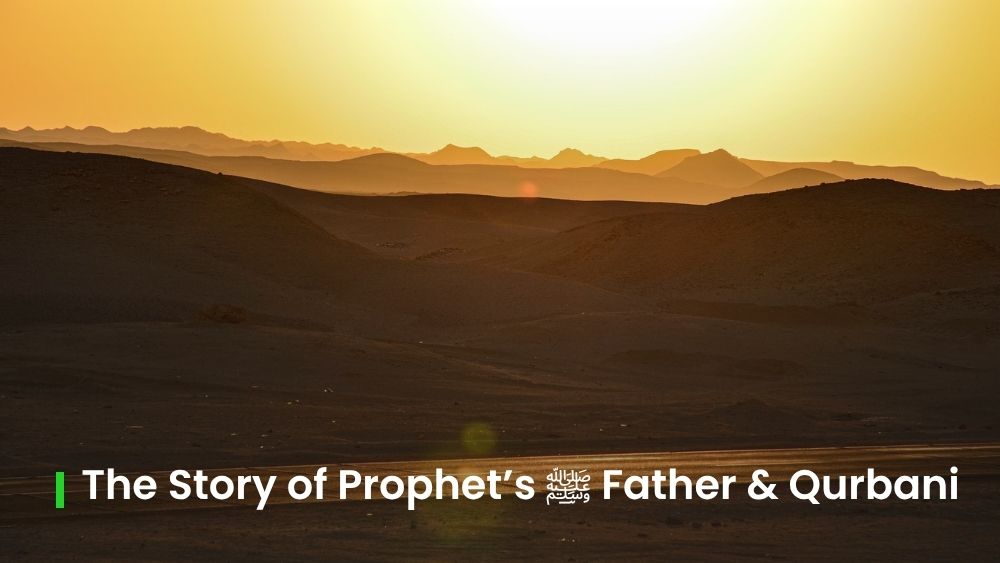We all know the story of Prophet Ibrahim (AS) and how he was commanded to sacrifice his son Ismail (AS). It’s a moment we remember by sacrificing animals for Allah every year. But did you know that years later, Prophet Muhammad’s ﷺ own father, Abdullah, was also set to be sacrificed?
This lesser-known story takes us back to Abdul Muttalib, the Prophet’s grandfather, who made a vow to Allah. It gives us a glimpse of the ignorance and mentality of the people at the time of Jahiliyyah.
Why is it important to talk about it? Because it is part of the Seerah of our beloved Prophet ﷺ. Let’s dive back 1,500 years in time and uncover this remarkable story of our Prophet’s ﷺ family.
The Rediscovery of Zamzam and the Vow
The Well of Zamzam was originally discovered miraculously by Hajar (AS) and Ismail (AS). It belonged to the people of Makkah for centuries. When the tribe of Jurhum was expelled from Makkah, they buried it with treasures to prevent others from accessing it.
Years later, Abdul Muttalib, the grandfather of Prophet Muhammad ﷺ, had a dream instructing him to dig at a specific location near the Kabah. With his only son at the time, Al-Harith, he began digging and unearthed the long-lost well of Zamzam.
A heated dispute soon broke out between him and the Quraysh leaders, who all wanted a share in its ownership. To resolve the matter, they agreed to consult a fortune-teller from Syria. As they set off across the desert, they ran out of water. Everyone became desperate, fearing death from thirst. The Quraysh gave up hope, and Abdul Muttalib miraculously found water.
Witnessing this miracle, the people saw it as a clear sign from Allah. They no longer insisted on sharing the well and accepted that Zamzam rightfully belonged to Abdul Muttalib.
During this time, Abdul Muttalib felt weak, as he had only one son to help him. In that moment of weakness, he made a sincere vow to Allah: if he were blessed with ten sons, he would sacrifice one of them for the sake of Allah.
The Lot Falls on Abdullah
As Allah blessed him with ten sons, Abdul Muttalib prepared to fulfill his vow. He cast lots to determine which son to sacrifice, and the lot fell on his youngest and most beloved son, Abdullah.
As Abdul Muttalib prepared to sacrifice Abdullah to fulfill his vow, people around him begged him to stop. They feared that if he went through with it, it might set a dangerous example. Because of the noble position of Abdul Muttalib, any father with ten sons would feel obligated to sacrifice one trying to follow him.
To stop this, they again went to the fortune-teller woman in Syria. She advised them to offer ten camels as ransom and cast lots between Abdullah and the camels. If the lot still fell on Abdullah, they should add ten more camels and try again. This process continued until the lot finally fell on the camels — at one hundred.
Abdul Muttalib then sacrificed the hundred camels, sparing Abdullah’s life. Interestingly, the people’s concerns proved valid. After this incident, the blood money (Diyah) for a person’s life in Arabia was permanently raised from ten camels to one hundred — the same number used to ransom Abdullah.
Note: Get our Seerah app to learn more about this event.
The Prophet’s ﷺ Lineage of Sacrifice
This profound event led to the Prophet Muhammad ﷺ being referred to as “Ibn al-Dhabihayn” (ابن الذبيحين) — the son of the two sacrificed ones — referring to his father, Abdullah, and his ancestor, Ismail (AS).
The Prophet ﷺ himself acknowledged this lineage in a hadith, saying:
أنا ابن الذبيحين
Meaning: “I am the son of the two sacrificed ones.” [Mustadrak Al-Hakim]
This underscores the deep-rooted tradition of sacrifice in the Prophet’s ﷺ lineage.
Highlights From the Story
1. Sincerity in Vows
Abdul Muttalib’s commitment to his vow teaches us the importance of sincerity and fulfilling promises made to Allah.
2. Diyah (Blood Money) in Islam
After Abdullah’s near sacrifice, the Diyah for a killed person was raised from 10 to 100 camels. This became the norm among the Arabs, and Islam later upheld it, making it a lasting ruling in Shari’ah.
3. Legacy of Sacrifice
The Prophet’s ﷺ lineage is marked by acts of sacrifice, reminding us of the significance of selflessness and devotion in Islam.
FAQs
Q: Why did Abdul Muttalib make such a vow?
A: In gratitude for rediscovering Zamzam and facing opposition, he vowed to sacrifice one of his sons if blessed with ten, showing his devotion to Allah. It also shows the ignorance and superstitions
Q: Is the hadith “I am the son of the two sacrificed ones” authentic?
A: While widely cited, scholars have disputed its chain of narration. Nonetheless, it is referenced in various Islamic texts and the statement itself is true and apparent.
Q: What is the significance of sacrificing 100 camels?
A: It set a precedent for blood money (Diyah) in Islamic tradition, later endorsed by the Prophet ﷺ as the standard compensation for manslaughter.
Final Thoughts
The story of Abdullah’s near sacrifice teaches us about strong faith, keeping promises, and the deep tradition of sacrifice in Islam. As we reflect on Qurbani, let us remember the profound lessons from the lives of those who came before us, embodying sincerity, trust, and devotion to Allah.

Leave a Reply